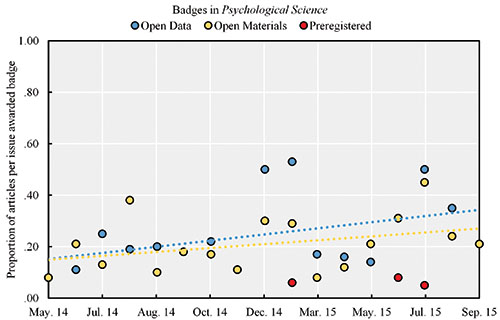Observation
Open Practice Badges in Psychological Science: 18 Months On
 In May 2014, an open research practices badge program was launched in Psychological Science. After about a year and a half, the results are promising: At least one out of about every three articles published in Psychological Science is conducted with specific attention to openness and transparency meriting a badge.
In May 2014, an open research practices badge program was launched in Psychological Science. After about a year and a half, the results are promising: At least one out of about every three articles published in Psychological Science is conducted with specific attention to openness and transparency meriting a badge.
The open practices badge program encourages authors to engage in open research practices and was devised in partnership with the Center for Open Science. Articles accepted for publication in Psychological Science may be awarded badges for meeting any or all of the following criteria:
- Open Data: The experiment’s data were submitted to an open-access repository.
- Open Materials: The experiment’s materials were submitted to an open-access repository.
- Preregistration: The study’s results were reported according to an open-access design and analysis plan formulated prior to data collection.
For an example of badges in action, see Colby, DeWitt, and Chapman (2015), the most recent article to be awarded all three badges.
These open practices are aimed at improving research quality and enhancing reproducibility, and yet they often go unrewarded.
“Despite the importance of open communication for scientific progress, present norms do not provide strong incentives for individual researchers to share data, materials, or their research process,” said APS Fellow Eric Eich, who introduced the new practices as Past Editor in Chief of Psychological Science.
Since the launch of the badge program, 307 articles have been published in Psychological Science, and 29% of those articles have been awarded at least one badge. In total, 145 badges have been awarded so far.
Data suggest that participation in the badge program has increased since its inception. On average, about three articles per issue were awarded Open Data and Open Materials badges in 2014, but around five articles per issue have been awarded these badges in 2015, while the number of articles per issue has remained about the same.
The proportion of articles awarded badges for Open Data or Open Materials seems to be on the rise, though these trends aren’t statistically significant. Several years’ more data are needed to detect a moderate effect, but initial evidence hints that adoption rates are moving in a good direction.
Either way, it’s clear that conducting research consistent with open practices is now a popular approach for many authors who publish their work in Psychological Science.
For more information about APS’s badge program, see www.psychologicalscience.org/open-practices.
Reference
Colby, H., DeWitt, J., & Chapman, G. B. (2015). Grouping promotes equality: The effect of recipient grouping on allocation of limited medical resources. Psychological Science, 26, 1084–1089. doi:10.1177/0956797615583978




APS regularly opens certain online articles for discussion on our website. Effective February 2021, you must be a logged-in APS member to post comments. By posting a comment, you agree to our Community Guidelines and the display of your profile information, including your name and affiliation. Any opinions, findings, conclusions, or recommendations present in article comments are those of the writers and do not necessarily reflect the views of APS or the article’s author. For more information, please see our Community Guidelines.
Please login with your APS account to comment.